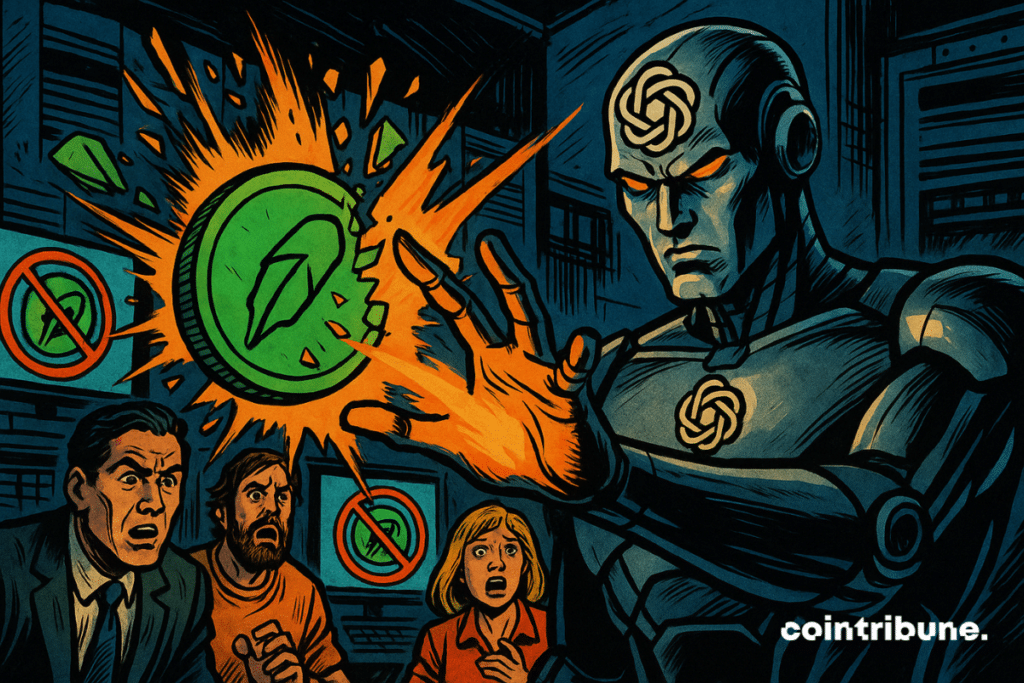OpenAI Publicly Disavows Robinhood’s Actions
As Robinhood accelerates in tokenized assets in Europe, OpenAI has just put a serious brake on it. The trading platform distributed “OpenAI” tokens without the approval of the AI firm. Musk gets involved, and the incident makes noise. What exactly does this misstep hide?

In brief
- OpenAI states that the tokens distributed by Robinhood do not represent any ownership rights in the company.
- The distribution was made as part of Robinhood’s launch of tokenized shares in Europe.
- Elon Musk publicly criticizes OpenAI’s current structure, which he considers flawed.
- Robinhood aims to democratize access to private markets through tokenization, despite legal risks.
OpenAI Tokens: Is Robinhood Going Too Far?
On July 1, 2025, Robinhood ceremoniously launched its layer 2 blockchain dedicated to trading tokenized stocks in Europe.
The operation was accompanied by an airdrop of tokens labeled “OpenAI” and “SpaceX,” intended to familiarize European investors with this new model. The problem: OpenAI never gave its green light.
In a statement released shortly afterward, the AI company firmly declared:
Were not involved in this, and do not endorse it. Any transfer of OpenAI equity requires our approval.
The warning is clear: the tokens given do not represent any real rights on OpenAI, and could mislead investors.
Robinhood, for its part, defends itself by explaining that these assets are issued through a “special purpose vehicle” to offer indirect exposure to private markets.
These tokens give retail investors indirect exposure to private markets, opening up access, and are enabled by Robinhood’s ownership stake in a special purpose vehicle.
A risky legal maneuver that has not convinced everyone, especially not Elon Musk. The entrepreneur, co-founder of OpenAI, slammed the operation on X: “Your ‘shares’ are fake.“
Musk, estranged from OpenAI since 2018, has ramped up criticisms of the current governance. He accuses the firm of betraying its original nonprofit mission and is currently suing the company.
Robinhood Between Innovation and Provocation
This legal misstep does not erase Robinhood’s broader strategy: establishing tokenization as the new global trading standard. Following the acquisition of Bitstamp in June and obtaining a MiCA license, the company is now operational in 27 European countries.
Its L2 blockchain, deployed on Arbitrum, allows users to trade over 200 US stocks and ETFs 24/7 without commissions. A technological leap that disrupts traditional schedules and financial barriers.
But this innovation comes with major regulatory challenges, especially when dealing with private, non-listed companies.
By offering “tokens” of companies like OpenAI, Robinhood blurs the line between symbolic representations and real financial securities.
The European Commission could quickly take up the case, especially as MiCA transparency rules demand increased rigor regarding the nature of the assets offered.
This case underscores how tokenization, as promising as it is, must contend with complex legal realities.
In summary, this OpenAI/Robinhood case reflects the growing tensions between financial innovation and regulatory rigor. While Robinhood appears to want to redraw the boundaries of global trading, its strategy may encounter legal and ethical limits. If tokenized finance wants to establish itself, it must first inspire trust.
Maximize your Cointribune experience with our "Read to Earn" program! For every article you read, earn points and access exclusive rewards. Sign up now and start earning benefits.
Passionné par le Bitcoin, j'aime explorer les méandres de la blockchain et des cryptos et je partage mes découvertes avec la communauté. Mon rêve est de vivre dans un monde où la vie privée et la liberté financière sont garanties pour tous, et je crois fermement que Bitcoin est l'outil qui peut rendre cela possible.
The views, thoughts, and opinions expressed in this article belong solely to the author, and should not be taken as investment advice. Do your own research before taking any investment decisions.